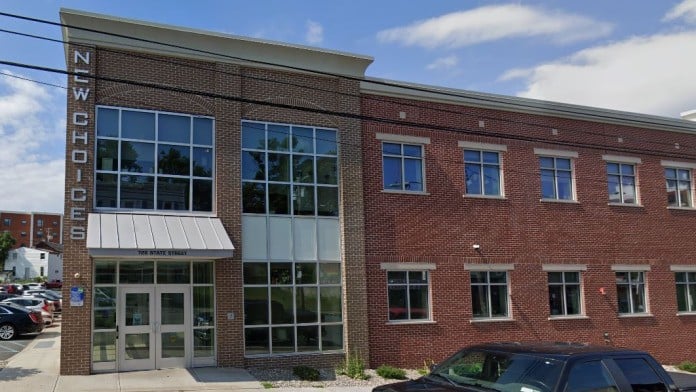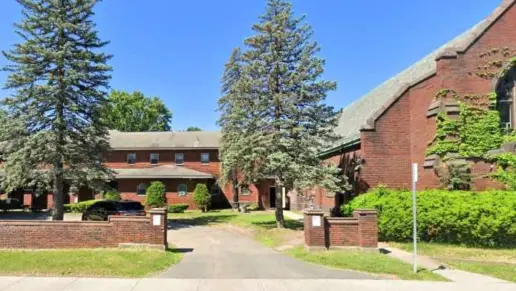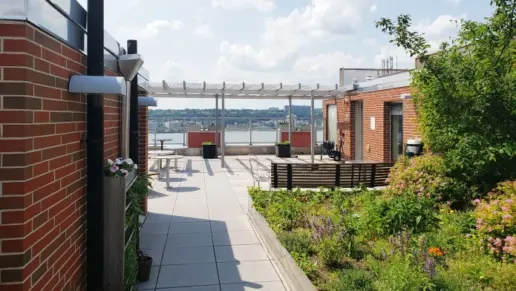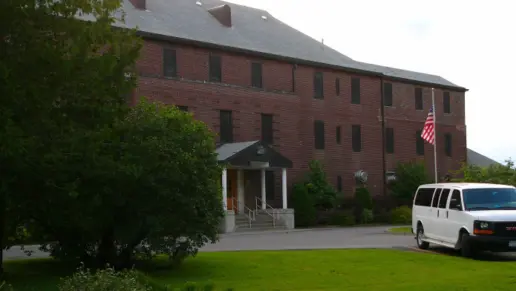About New Choices Recovery Center – 846 State Street
New Choices Recovery Center- 840 State Street is a drug and addiction treatment center that provides services in an outpatient format. They are located in Schenectady, New York, and offer care that is holistic and client centered, addressing the physical, mental, spiritual, emotional, and behavioral aspects of each person.
New Choices Recovery Center- 840 State Street provides outpatient treatment services, medication assisted treatment and aftercare.
Outpatient treatment services at New Choices Recovery Center begin with an assessment that helps determine the best treatment plan for each person. This assessment will also help determine if medication assisted treatment is a suitable option for treatment. All services are offered by a multidisciplinary team that utilizes evidence-based modalities including motivational interviewing, harm reduction techniques, trauma-informed care, and an introduction to recovery-oriented systems of care.
Medication Assisted Treatment provides medications along with comprehensive medical, psychiatric, and behavioral counseling. FDA approved medications are used to support withdrawal from opioid drugs and to help maintain long-term abstinence. By combining medication with mental health treatment, a greater chance of success is achieved for long-term abstinence.
Trauma is often a root cause of addiction, changing the brain and biochemistry. Trauma therapy addresses traumatic incidents through scientifically proven and evidence-based treatment methods that help target the nervous system’s processing centers, which help to create balance mentally, emotionally, and physically.
Group therapy involves treatment through the process of connecting in a group setting to discuss and work through mental, emotional, and physical issues. There are a number of different group therapy modalities, including support groups, experiential therapy, psycho-education, and more.
Aftercare programming is for individuals who have successfully gone through a treatment program but who desire or need continual support once returning home. These programs often include alumni groups, group therapy, 12 Step meetings, SMART meetings, and individual therapy. The purpose is to provide a safe space to continuously work on recovery. At New Choices Recovery Center, they provide support with planning for long-term care upon completion of their programming.
Latest Reviews
Rehab Score
Gallery


Location
Accepted Insurance
Other Forms of Payment
Private insurance refers to any kind of healthcare coverage that isn't from the state or federal government. This includes individual and family plans offered by an employer or purchased from the Insurance Marketplace. Every plan will have different requirements and out of pocket costs so be sure to get the full details before you start treatment.
Self-pay involves paying for treatment out of your own pocket. You can use savings or credit, get a personal loan, or receive help from family and friends to fund your treatment. If you don't have insurance or your insurance plan doesn't cover a specific program, self-pay can help ensure you still get the care you need.
Financial aid can take many forms. Centers may have grants or scholarships available to clients who meet eligibility requirements. Programs that receive SAMHSA grants may have financial aid available for those who need treatment as well. Grants and scholarships can help you pai for treatment without having to repay.
Sliding scale payments are based on a client's income and family size. The goal is to make treatment affordable to everyone. By taking these factors into account, addiction recovery care providers help ensure that your treatment does not become a financial burden to you or your family, eliminating one barrier to care.
Medicaid is a state based program that helps lower-income individuals and families pay for healthcare. Medicaid covers addiction treatment so those enrolled can use their coverage to pay for rehab. When a program accepts Medicaid the client often pays very little or nothing out of their own pocket.
Addiction Treatments
Levels of Care
Treatments
The goal of treatment for alcoholism is abstinence. Those with poor social support, poor motivation, or psychiatric disorders tend to relapse within a few years of treatment. For these people, success is measured by longer periods of abstinence, reduced use of alcohol, better health, and improved social functioning. Recovery and Maintenance are usually based on 12 step programs and AA meetings.
When you choose drug rehab in New York, you'll participate in a variety of treatments that are designed to help you live a drug-free lifestyle. Common methods of treatment include group, individual, and family counseling, medication management, nutrition, exercise, and management of co-occurring mental health disorders.
Many of those suffering from addiction also suffer from mental or emotional illnesses like schizophrenia, bipolar disorder, depression, or anxiety disorders. Rehab and other substance abuse facilities treating those with a dual diagnosis or co-occurring disorder administer psychiatric treatment to address the person's mental health issue in addition to drug and alcohol rehabilitation.
A combined mental health and substance abuse rehab has the staff and resources available to handle individuals with both mental health and substance abuse issues. It can be challenging to determine where a specific symptom stems from (a mental health issue or an issue related to substance abuse), so mental health and substance abuse professionals are helpful in detangling symptoms and keeping treatment on track.
Opioid rehabs specialize in supporting those recovering from opioid addiction. They treat those suffering from addiction to illegal opioids like heroin, as well as prescription drugs like oxycodone. These centers typically combine both physical as well as mental and emotional support to help stop addiction. Physical support often includes medical detox and subsequent medical support (including medication), and mental support includes in-depth therapy to address the underlying causes of addiction.
Programs


Clinical Services
Family therapy helps individual members of the family unit navigate the complexities of addiction. Therapists provide you with the tools you need to improve communication skills and conflict resolution. When families work together, they can support their loved one's recovery and help to restore balance and harmony within the household.
Group therapy is any therapeutic work that happens in a group (not one-on-one). There are a number of different group therapy modalities, including support groups, experiential therapy, psycho-education, and more. Group therapy involves treatment as well as processing interaction between group members.
In individual therapy, a patient meets one-on-one with a trained psychologist or counselor. Therapy is a pivotal part of effective substance abuse treatment, as it often covers root causes of addiction, including challenges faced by the patient in their social, family, and work/school life.
Life skills trainings involve all the skills a person must have in order to function successfully in the world. These include time management, career guidance, money management, and effective communication. Truly successful addiction recovery is based on the ability to not only live substance-free, but to thrive. Life skills teaches the practical necessities of functioning in society, which sets clients up for success in life, and therefore sobriety.
Amenities
-
Residential Setting
Staff

Executive Director

Medical Director

Director of Finance and Facilities Management

Director of Operations & Impaired Driver Program

Director of Reintegration Residential Services

Agency Clinical Director

Director of Clinical Support Services

Director of Permanent Supportive Housing
Contact Information
728 State Street
Schenectady, NY 12307







